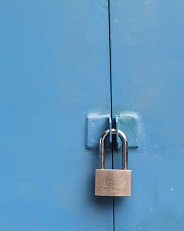
— Philadelphia D.A. Larry Krasner, quoted by NBC10 Philadelphia on March 22, 2021.
Something strange happened in Philly early in 2014. The late Norman Johnson signed a deed from the grave, transferring a South Philadelphia rowhouse for only $15,000 to Amen Brown. Dawn Presbery, the daughter of the deceased and the home’s real owner, fought for two years to recover the deed.
In some cases like this, the D.A. prosecutes, and the person named on the deed ultimately has to sign a new deed to restore the title to its rightful owner. Here, the forgery was pursued in the criminal courts, but the case against Brown was thrown out.
Brown claims to have parted with the $15,000 at the urging of a scammer on Craigslist. But regardless of Brown’s story, as Max Marin noted for Billy Penn, it’s astonishing that even criminal charges didn’t induce Brown to return the house title to its rightful owner.
The Philadelphia Court of Common Pleas finally ordered the forged deed returned to Dawn Presbery. Later, with remarkable chutzpah, Brown won an election to Pennsylvania’s House of Representatives, assumed office on December 1, 2020, and set out this year to pass tough-on-crime bills and to defend the rights of homeowners to keep their homes.
Tangled Webs of Harm

Stealing deeds from the dead is surprisingly common in the gentrifying regions of Philadelphia.
These are forgery cases, and they often create tangled webs of harm. When someone forges the late owner’s name and has the signature notarized, the heirs lose the house and its accumulated value. When the house is flipped to a buyer, there’s a new deed holder in the chain. New buyers may move in and start investing in repairs. Then the heirs notice something is going on. All at once, the heirs and the buyers are pitted against one another. The forger, by then, has skittered off to the next opportunity.
Forgery makes a deed void. But the heirs need legal help to pursue a quiet title action in court, prove forgery, have the illicit deed set aside, and have a new need notarized for the record.
The buyers also need legal representation. The heirs are wresting the home back from them — now with repairs done, and maybe new features added — while the buyer who paid for it all is stranded without a deed. Needless to say, these cases are harrowing for all involved.
The city District Attorney’s Office includes an Economic Crimes Unit that goes after some of the most brazen deed thieves. On its payroll is an elder justice lawyer who oversees cases vulnerable older homeowners. Among recently prosecuted cases:
- A series of thefts from vulnerable Philadelphians through deed fraud, forgery, theft, conspiracy, and related crimes. One of the five people arrested for stealing 11 Philly homes was the notary.
- A case of a deed thief who got 14 homes.
Assistant D.A. Kimberly Esack in the Economic Crimes unit cited the hot housing market as a contributing factor to spike in deed theft.
Deed Theft Prevention Measures
In keeping with a nationwide trend, Philadelphia emails automated notices to people whose names appear on real estate filings. Since 2019, the alerted people are allowed to review the documents online at no charge. Before that, they had to pay to look through the Philadox system.
The city records department now identifies notaries in the system, too. This measure will help deter and catch fraudulent notary activities.
Additionally, the Philadelphia Bar Association has convened a Fraudulent
Conveyance Task Force. In addition to representatives from the records
department, the task force includes the District Attorney’s Office and the police,
the Register of Wills, elected representatives and government officials,
attorneys, notaries, title insurers and nonprofit advocacy groups. Not
surprisingly, the task force recommends harsher penalties for deed fraud.
☛ Some homeowners assume the easiest way to pass the title to their home on to its next owner is by adding a name to the deed. Be careful. Understand the estate planning pitfalls of adding someone to your house deed.
Resources for people with deed conflicts include the following options:
- The Philadelphia Bar Association, through its Lawyer Referral and Information Service, guides people to qualified lawyers for any kind of legal problem. An initial consultation costs $35. When necessary, the connected lawyers may be able to handle cases free of charge or at deep discounts.
- The Philadelphia Department of Records publishes a deed fraud page that explains the Fraud Guard email alert system, and points to free legal services for low-income residents.
- The Register of Wills has a new fee deferral option for to help people pay for the administration of the estates of deceased relatives. Through this process new deeds will be created in the names of the legal heirs.
City Council Hears Deed Fraud Testimony
In March 2021, the Fraudulent Conveyance Task Force held a hearing. Attorney Judy Berkman of Pennsylvania’s nonprofit Regional Housing Legal Services addressed Philadelphia’s City Council Committee on Intergenerational Affairs and Aging. The passing away of a homeowner without anyone administering the estate and deed fraud, Berkman says, are prime cases of “tangled title” — the lack of a deed naming a current, rightful owner.
As for deed fraud, says Berkman, there’s an even tricker matter than forgery. That is the deed theft in which a real homeowner actually does sign the deed. This arises most often when an elderly person owns and still lives in the home. A caregiver (who might or might not be related to the homeowner) puts pressure on the elder to sign a deed or power of attorney with a notary present. The manipulator thereby seizes rights over the property.
To rectify these situations, the homeowner would need legal representation to show threats or coercion. Or a court would need to examine evidence showing the owner lacked capacity to understand the papers and the effect of signing them.
We wonder in these cases what the notary was thinking. Some notaries are simply duped. Others are in on the scheme. Still other notaries have their identities stolen, and wind up mired in cases they knew nothing about. There is also the matter of notario fraud, mainly among Hispanic homeowners. In Spanish-speaking countries, a notario means a person with skills and training tantamount to a lawyer’s. Because of linguistic confusion, notaries using the word notario can give vulnerable people the impression they’re dispensing legal advice.
In Philly and Everywhere, Fraud Happens. Protect Yourself.

State law controls the recording of deeds, so local recording offices are not at liberty to create their own rules for sniffing out bad deeds. If a deed meets procedural rules, it gets recorded, and fraud happens. Knowing this, what can we all do to lessen the risks?
One important way for individuals to counter deed fraud is for anyone buying real estate to get title insurance when buying the home, and check in advance to be sure the policy will cover deed theft and fraud. Title insurance is optional. But, for reasons this article underscores, it’s important. Unlike the case with homeowner’s insurance, there is only one upfront premium to pay for a title policy. And the state sets out the price.
Another way we can help, Attorney Berkman points out, is to know the people in our community. We can check on the vulnerable and make sure they are safe. If we have reason to believe something harmful may impact their property rights, letting them know how to call for help might be the most neighborly gesture we could make.
Supporting References
Max Marin for Billy Penn: West Philly State Rep. Amen Brown Implicated in Deed Fraud, Other Lawsuits (Jun. 30, 2021).
Ryan Briggs for WHYY (National Public Radio/PBS): West Philly State Rep. to Introduce Bill Banning Sheriff Sales Through August (Mar. 31, 2021).
David Chang for News 10 Philadelphia: Five People Accused of Stealing 11 Philly Homes Through Deed Fraud (NBC Universal Inc., Mar. 22, 2021).
Laura Benshoff for WHYY (National Public Radio/PBS): Philadelphia Man Charged With Stealing 14 Homes Through Deed Theft (May 3, 2021).
Craig R. McCoy for The Inquirer: Philly Announces a Crackdown on Rampant Housing Theft (updated Oct. 30, 2019).
Nora Davenport for Regional Housing Legal Services: Judy Berkman Testifies to City Council on Deed Fraud (Mar. 24, 2021).
Photo credits: Muhammad Zaqy Al Fattah, Adeolu Eletu, and Logan Weaver, via Unsplash.
